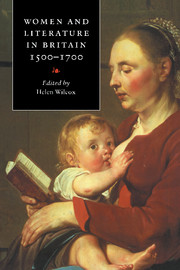Book contents
- Frontmatter
- Contents
- List of contributors
- Acknowledgements
- A note on references
- Chronology: women and literature in Britain, 1500–1700
- Introduction
- Part I CONSTRUCTING WOMEN IN EARLY MODERN BRITAIN
- Chapter 1 Humanist education and the Renaissance concept of woman
- Chapter 2 Religion and the construction of femininity
- Chapter 3 Advice for women from mothers and patriarchs
- Chapter 4 Women reading, reading women
- Chapter 5 Women/‘women’ and the stage
- Chapter 6 Feminine modes of knowing and scientific enquiry: Margaret Cavendish's poetry as case study
- Part II WRITING WOMEN IN EARLY MODERN BRITAIN
- Further reading
- Index
Chapter 3 - Advice for women from mothers and patriarchs
Published online by Cambridge University Press: 22 September 2009
- Frontmatter
- Contents
- List of contributors
- Acknowledgements
- A note on references
- Chronology: women and literature in Britain, 1500–1700
- Introduction
- Part I CONSTRUCTING WOMEN IN EARLY MODERN BRITAIN
- Chapter 1 Humanist education and the Renaissance concept of woman
- Chapter 2 Religion and the construction of femininity
- Chapter 3 Advice for women from mothers and patriarchs
- Chapter 4 Women reading, reading women
- Chapter 5 Women/‘women’ and the stage
- Chapter 6 Feminine modes of knowing and scientific enquiry: Margaret Cavendish's poetry as case study
- Part II WRITING WOMEN IN EARLY MODERN BRITAIN
- Further reading
- Index
Summary
Conduct books were bestsellers during the Renaissance, and those by women were among the most popular books that women wrote between 1500 and 1700. Directing most of their advice to the practice of daily living, they came in the form of manuals, dialogues and commentaries on behaviour, marriage or the household, and their audience included all readers who sought direction in how to lead a godly and proper life. Such works were the counterpart to our modern self-help books in that they offered early modern women advice on how to improve their lives. Most of them were written by men; but between 1604 and1624 five books by women were published in England that will serve as the focus for this discussion of early modern conduct literature. All of these are mothers' advice books, where the writer's role as mother offers her a position of authority from which to speak. I want first to situate these texts in relation to physiological and religious accounts that displaced women's role in reproduction; then to consider the occasions and contradictions of the mothers' books; and finally to relate them to other conduct literature in terms of the problems they pose for the subjectivity of early modern women.
Advice for women, given by their mothers, needs to be understood in the context of the views of motherhood prevailing in the Renaissance.
- Type
- Chapter
- Information
- Women and Literature in Britain, 1500–1700 , pp. 56 - 79Publisher: Cambridge University PressPrint publication year: 1996
- 11
- Cited by



